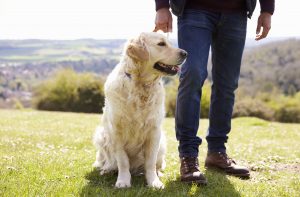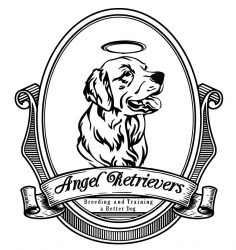Angel Retrievers hand-selects prospective puppies to be matched as assistance dogs. These dogs are available to approved applicants who wish to continue training the dog to become a service dog for someone with a disability.
Assistance dogs must have a temperament different than most pet dogs. Only about 1 in 300 dogs will have the innate abilities to perform in a way that would assist, rather than hinder, someone who is disabled, while also remaining safe and focused in public settings. While it is rare to find dogs that work for service work, our breeding program has been designed to accomplish this very goal for generations. Our staff consists of breeding and whelping experts who study and attend conferences each year to improve working dog lines, and have the knowledge to intentionally and succesfully socialize our puppies to prepare them for service work. While it can never be guaranteed that a puppy will be able to graduate as an assistance dog, the chances of one of our dogs reaching certification is extraordinarily high.
Our dogs will be placed based on their natural talents, propensities, and personalities. We can place them for continued training as mobility, autism, psychiatric, hearing, diabetic, or seizure alert assistance dogs. Lessons are included at no additional fee, every month, for the life of your dog, either in-person, or through virtual sessions where we can see you and the dog learning and working together. For more information on fully trained assistance dogs, you should visit the other program we founded, www.littleangelsservicedogs.org.
For the pup to be a fully trained service dog, the owner will need to spend additional time training and working with their dog, along with the guidance and instruction from our trainers. Complete instruction on the ID’s, vests, legal public access according to the Americans with Disabilities Act, and local state laws, is gone over in great detail to prepare the owner for public access with their dog. In addition to personalized training, adopters also receive one of our books on How to Train an Assistance Dog, written by Katie Gonzalez, the Founder of both Angel Retrievers and Little Angels Service Dogs.
We can certify Angel Retriever teams, and uphold to strict standards for certification.

STANDARDS FOR CERTIFICATION OF OWNER-TRAINED ASSISTANCE DOG TEAMS
Our standards for certification go beyond what is strictly required by the Americans with Disabilities Act. We have an obligation to you, the animal and society to make an informed and unemotional decision based off our observation and interactions with both the animal and their handler.
It is important to understand our requirements for certifying a dog after training. While a majority of our requirements can be addressed through proper training and leadership, some innate characteristics may make a dog unsuitable to become a service dog. Issues such as aggression, which includes not only biting but growling, snarling, showing of teeth or even warning body language towards people, adult or child, usually means the dog has a predisposition to show guarding behaviors or is naturally wary of people which means it cannot be considered by our program as a service dog candidate. Our contract states that if an Angel Retriever is showing any of these signs, the owner has the right to exchange the dog.
In order to certify your dog, we will need to work with you and your dog for a minimum of 6 months, with monthly updates as well as observation of you and the dog at least 4 separate times. At least two of these sessions must be in-person, while the rest have the option of being done virtually where we can see you and the dog working together live. We must be able to witness you working with the dog in varying locations, including your home and multiple public settings, real-time (not previously recorded).
Your dog must be at least one year of age to receive certification, and must be at least one year of age when taking the certification testing. While your investment of in-person sessions may be low, keep in mind that we are already very familiar with your dog, having trained it ourselves for at least 4 months before you took over training, with our guidance and instruction.
Certification testing is provided twice a year, in both written form, as well as through demonstration in a field test in public settings. The following must be presented or demonstrated to us at testing.
For this test you must:
-Provide a note from your medical provider, documenting your disability.
-Provide proof of spay/neuter for the dog.
-Provide proof of vaccinations and microchip.
-Have participated in at least two in-person sessions, with a minimum total of four live sessions.
-Have participated in updates at least once a month for six months.
-Pass our written test demonstrating a knowledge of acceptable training techniques, demonstrate an understanding of canine care and health, demonstrate an ability to maintain training, problem solve, and continue to train new skills as required with the assistance dog, and demonstrate the knowledge of local access laws and proper service dog etiquette. (We will teach you all of this material).
-Pass our field test in a public setting demonstrating your ability to handle the dog safely and effectively.
For this test the dog must:
-Be of sexual maturity (at least 12 months of age)
-Be of a temperament where they are calm and non-reactive in being approached by adult males and females, children, people in hats, sunglasses, wheelchairs, walkers, canes, scooters, etc.
-Be of a temperament that new situations, places, people, and other stimuli does not create a negative reaction and/or cause them to become distracted and lose focus on their handler.
-Be of a temperament where they are not reactive to other dogs and are capable of normal social activity with other socialized dogs.
-Be of a temperament where they are not reactive to birds, squirrels, rabbits, rodents, cats, or other animals wild or domesticated.
-Be of a temperament where they will accept being handled by a competent third party without undue stress or anxiety.
-Knows and responds to, regardless of distraction, seven basic command (Heel, Sit, Down, Stay, Come, Watch-me, Touch, )
-Knows and responds to, regardless of distraction, at least 3 advanced commands/tasks that are directly associated with mitigating a handler’s disability.
Testing and certification is included with your dog’s adoption fee which includes field testing, written testing, veterinary and health record review, monthly follow-up with a trainer for the first 6 months, a new service dog vest/cape, laminated ID, and a certificate. The vest/cape and certificate are only provided upon successful completion of testing and will be mailed to you shortly after passing testing.
Recertification is required 12 months after initial certification, and then again once a year. If Angel Retrievers observes, or is aware of, inappropriate behavior, temperament, health, or training issues, the program can decide to discharge the dog from training or certification as an assistance dog.


